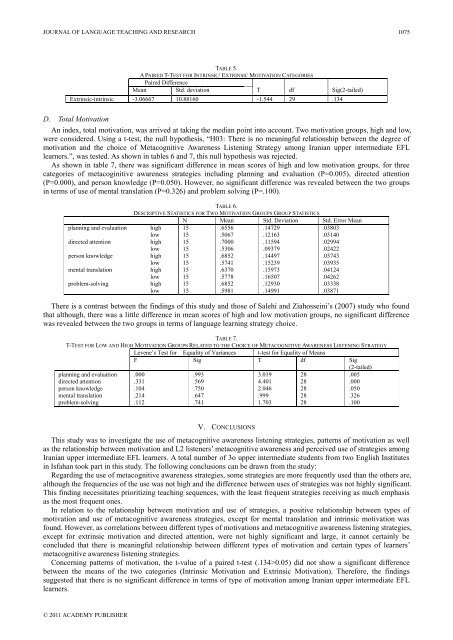Journal of Language Teaching and Research Contents - Academy ...
Journal of Language Teaching and Research Contents - Academy ...
Journal of Language Teaching and Research Contents - Academy ...
You also want an ePaper? Increase the reach of your titles
YUMPU automatically turns print PDFs into web optimized ePapers that Google loves.
JOURNAL OF LANGUAGE TEACHING AND RESEARCH<br />
© 2011 ACADEMY PUBLISHER<br />
TABLE 5.<br />
A PAIRED T-TEST FOR INTRINSIC/ EXTRINSIC MOTIVATION CATEGORIES<br />
Paired Difference<br />
Mean Std. deviation T df Sig(2-tailed)<br />
Extrinsic-intrinsic -7410003 01444001 -1.544 .5 .134<br />
D. Total Motivation<br />
An index, total motivation, was arrived at taking the median point into account. Two motivation groups, high <strong>and</strong> low,<br />
were considered. Using a t-test, the null hypothesis, ―H03: There is no meaningful relationship between the degree <strong>of</strong><br />
motivation <strong>and</strong> the choice <strong>of</strong> Metacognitive Awareness Listening Strategy among Iranian upper intermediate EFL<br />
learners.‖, was tested. As shown in tables 6 <strong>and</strong> 7, this null hypothesis was rejected.<br />
As shown in table 7, there was significant difference in mean scores <strong>of</strong> high <strong>and</strong> low motivation groups, for three<br />
categories <strong>of</strong> metacoginitive awareness strategies including planning <strong>and</strong> evaluation (P=0.005), directed attention<br />
(P=0.000), <strong>and</strong> person knowledge (P=0.050). However, no significant difference was revealed between the two groups<br />
in terms <strong>of</strong> use <strong>of</strong> mental translation (P=0.326) <strong>and</strong> problem solving (P=.100).<br />
TABLE 6.<br />
DESCRIPTIVE STATISTICS FOR TWO MOTIVATION GROUPS GROUP STATISTICS<br />
N Mean Std. Deviation Std. Error Mean<br />
planning <strong>and</strong> evaluation high 02 .6556 .14729 .03803<br />
low 02 .5067 .12163 .03140<br />
directed attention high 02 .7000 .11594 .02994<br />
low 02 .5306 .09379 .02422<br />
person knowledge high 02 .6852 .14497 .03743<br />
low 02 .5741 .15239 .03935<br />
mental translation high 02 .6370 .15973 .04124<br />
low 02 .5778 .16507 .04262<br />
problem-solving high 02 .6852 .12930 .03338<br />
low 02 .5981 .14991 .03871<br />
There is a contrast between the findings <strong>of</strong> this study <strong>and</strong> those <strong>of</strong> Salehi <strong>and</strong> Ziahosseini’s (2007) study who found<br />
that although, there was a little difference in mean scores <strong>of</strong> high <strong>and</strong> low motivation groups, no significant difference<br />
was revealed between the two groups in terms <strong>of</strong> language learning strategy choice.<br />
TABLE 7.<br />
T-TEST FOR LOW AND HIGH MOTIVATION GROUPS RELATED TO THE CHOICE OF METACOGNITIVE AWARENESS LISTENING STRATEGY<br />
Levene’s Test for Equality <strong>of</strong> Variances t-test for Equality <strong>of</strong> Means<br />
F<br />
Sig<br />
T<br />
df<br />
Sig<br />
(2-tailed)<br />
planning <strong>and</strong> evaluation .000<br />
.993<br />
3.019 28<br />
.005<br />
directed attention<br />
.331<br />
.569<br />
4.401 28<br />
.000<br />
person knowledge<br />
.104<br />
.750<br />
2.046 28<br />
.050<br />
mental translation<br />
.214<br />
.647<br />
.999<br />
28<br />
.326<br />
problem-solving<br />
.112<br />
.741<br />
1.703 28<br />
.100<br />
V. CONCLUSIONS<br />
This study was to investigate the use <strong>of</strong> metacognitive awareness listening strategies, patterns <strong>of</strong> motivation as well<br />
as the relationship between motivation <strong>and</strong> L2 listeners’ metacognitive awareness <strong>and</strong> perceived use <strong>of</strong> strategies among<br />
Iranian upper intermediate EFL learners. A total number <strong>of</strong> 3o upper intermediate students from two English Institutes<br />
in Isfahan took part in this study. The following conclusions can be drawn from the study:<br />
Regarding the use <strong>of</strong> metacognitive awareness strategies, some strategies are more frequently used than the others are,<br />
although the frequencies <strong>of</strong> the use was not high <strong>and</strong> the difference between uses <strong>of</strong> strategies was not highly significant.<br />
This finding necessitates prioritizing teaching sequences, with the least frequent strategies receiving as much emphasis<br />
as the most frequent ones.<br />
In relation to the relationship between motivation <strong>and</strong> use <strong>of</strong> strategies, a positive relationship between types <strong>of</strong><br />
motivation <strong>and</strong> use <strong>of</strong> metacognitive awareness strategies, except for mental translation <strong>and</strong> intrinsic motivation was<br />
found. However, as correlations between different types <strong>of</strong> motivations <strong>and</strong> metacognitive awareness listening strategies,<br />
except for extrinsic motivation <strong>and</strong> directed attention, were not highly significant <strong>and</strong> large, it cannot certainly be<br />
concluded that there is meaningful relationship between different types <strong>of</strong> motivation <strong>and</strong> certain types <strong>of</strong> learners’<br />
metacognitive awareness listening strategies.<br />
Concerning patterns <strong>of</strong> motivation, the t-value <strong>of</strong> a paired t-test (.134>0.05) did not show a significant difference<br />
between the means <strong>of</strong> the two categories (Intrinsic Motivation <strong>and</strong> Extrinsic Motivation). Therefore, the findings<br />
suggested that there is no significant difference in terms <strong>of</strong> type <strong>of</strong> motivation among Iranian upper intermediate EFL<br />
learners.<br />
1075

















